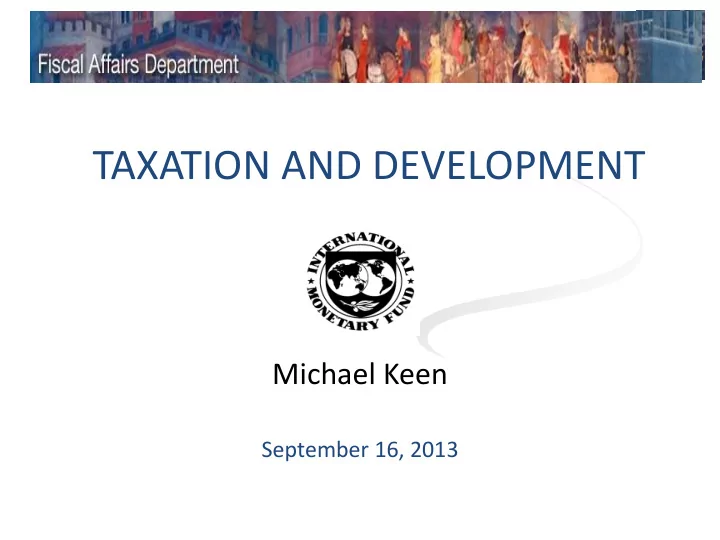

TAXATION AND DEVELOPMENT Michael Keen September 16, 2013
OBJECTIVES
Revenue Yes — but not the only concern Efficiency and Growth • For advanced economies, hierarchy: Real estate (best) – VAT/excises – PIT – CIT(worst) • But limited evidence, especially for developing countries: — Some signs efficiency gains from VAT — That CIT may not be worst — And that trade liberalization fosters growth
Distributional Impact Important in itself and for support of tax system — Need to consider impact of all taxes (and spending) — Who really bears tax burden not always as it seems Statebuilding and Governance Taxation central to bargaining between state and citizens, hence to wider state building — But what difference does this make?
ISSUES AND LESSONS
The Rise (and Rise) of the VAT 160 140 120 100 80 60 40 20 0 1980 1985 1990 1995 2000 2005 2010 High Income Other Countries
Some evidence that VAT has proved relatively efficient To capitalize on its potential strengths, standard advice is for: • Single rate • Broad base — some exemptions (almost) unavoidable • Fairly high threshold
What about equity? • Most studies find VAT no less progressive than taxes it replaces — and may underestimate fairness (e.g. purchases from small retailers, and by non-compliant firms) • Preferences benefit most the better-off — The poor may spend 25 relatively more on (e.g.) 20 food, but rich spend 15 absolutely more (Mexico) 10 5 0 I II III IV V VI VII VIII IX X Percent of total subsidy Percent of income • Even limited ability to target spending may be enough for poor to benefit from uniform rates: e.g. Ethiopia
VAT Challenges: • Understanding and managing non-compliance —e.g. How to encourage ‘good’ VAT chains? • Improving refund procedures and audit • Little room to raise standard rates in many lower income countries — But gains from broadening base policy and improving compliance: 2% of GDP in some lower income countries
Trade Taxes Low Income Countries • Rates, revenue in decline 14 • Easy to collect, but bad 12 for growth 10 8 • Challenges: Tax Revenue 6 Trade Revenue – Recovering lost revenue 4 problematic in some LICs 2 – Administrative challenges 0 from formation of customs unions (how implement the VAT without internal frontiers?) 10
Personal income tax • Revenue stagnant in LICs – Almost all is wage withholding by large firms • ‘Global’ PIT (tax on sum of income from all sources) has failed — move to schedular systems with more coherent taxation of capital income? • More action on high-income individuals? – Limit exemptions; strengthen international cooperation… 11
Corporate Income Tax Rates falling, but revenue has held up — though less (pre-crisis) than elsewhere Low-Income Countries High Income 2.50 0.60 4.00 0.50 0.45 3.50 0.50 2.00 0.40 3.00 0.35 0.40 Percent points Percent Points 2.50 1.50 0.30 0.30 2.00 0.25 1.00 0.20 1.50 0.20 0.15 1.00 0.50 0.10 0.10 0.50 0.05 0.00 0.00 0.00 0.00 1980 1982 1984 1986 1988 1990 1992 1994 1996 1998 2000 2002 2004 2006 2008 Corporate Tax Revenue(%GDP) Corporate Tax Revenue (%GDp) Corporate Tax Rate (Right Axis) Corporate Tax Rate (Right Axis) May reflect spread of incentives in some regions 12
Challenges: • Incentives — Threaten revenue, including from profit-shifting — Only attract FDI if governance good — Adversely affect governance, especially if discretionary • Profit-shifting — BEPS especially important for developing countries • Case for regional/wider cooperation, including on policy, becoming stronger? 1 3
Excises Attractive for revenue and addressing externalities, but seem to be in trend decline (except Asia?) Challenges: • Significant potential in cigarettes, fuel …but is more coordination to address cross -border issues needed to realize it? • Mobile phones — role for excises if licences not auctioned?
Small Businesses • Limited revenue potential… — and remember may already pay tax on inputs … but importance goes beyond that — competitive distortions, tax morale, state building • Simplified regime, aligned to VAT threshold? • Administrative focus on their special features 15
Property Taxes Revenue potential modest in absolute terms, but: — Could be transformative for local governments — A relatively easy source of some progressivity? Challenges — Mainly administrative: developing cadasters and valuation methods 16
INSTITUTIONS AND TRANSPARENCY
The informed discussion needed for sustained progress calls for: • Simple, transparent, easily accessible tax rules • Tax expenditure analysis — Costing preferences helps to decide if offsetting benefits — Much good practice in Latin America, now starting in Africa (Senegal, Morocco) • Capable tax policy units
EXTRACTIVE INDUSTRIES
A key revenue source for (increasingly) many…
Multiple Instruments Needed • Balance rent taxes and royalties a key choice • Rent taxation is most efficient in principle • Royalties distort extraction and exploration — but may still have an important role, to: – Assure some revenue from Day 1 of production – Recognize that rents may be hard to observe perfectly – Help implement a depletion policy • Plus issues of corporate tax, VAT, customs, state participation, auctions, environmental aspects…
Should Resource Taxes Be Progressive? ..In sense of government’s share being larger the higher are prices/profits/lifetime project return? • Yes, if government better able to bear risk than investor – But opposite likely true in many developing countries • Political pressures may make progressive systems more robust and credible
CONCLUDING
• Countries are different — and progress can be hard • But we know a lot, thanks to successful reformers, about what works (and what doesn’t) • One lesson is that the issue is not just capacity — political will is critical
Recommend
More recommend